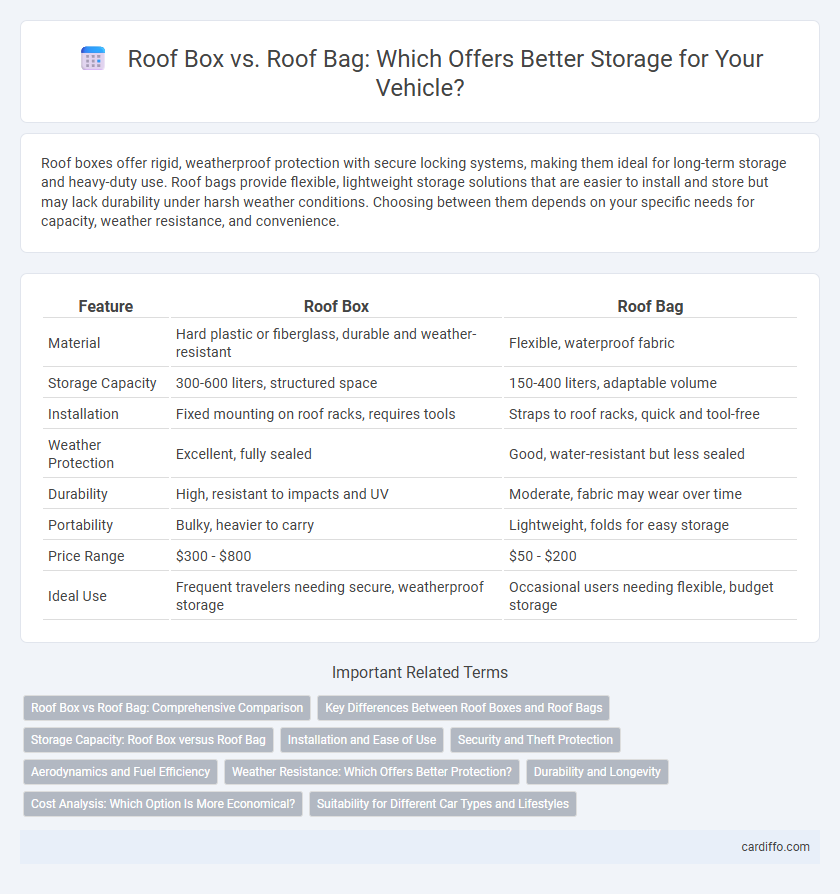Roof boxes offer rigid, weatherproof protection with secure locking systems, making them ideal for long-term storage and heavy-duty use. Roof bags provide flexible, lightweight storage solutions that are easier to install and store but may lack durability under harsh weather conditions. Choosing between them depends on your specific needs for capacity, weather resistance, and convenience.
Table of Comparison
| Feature | Roof Box | Roof Bag |
|---|---|---|
| Material | Hard plastic or fiberglass, durable and weather-resistant | Flexible, waterproof fabric |
| Storage Capacity | 300-600 liters, structured space | 150-400 liters, adaptable volume |
| Installation | Fixed mounting on roof racks, requires tools | Straps to roof racks, quick and tool-free |
| Weather Protection | Excellent, fully sealed | Good, water-resistant but less sealed |
| Durability | High, resistant to impacts and UV | Moderate, fabric may wear over time |
| Portability | Bulky, heavier to carry | Lightweight, folds for easy storage |
| Price Range | $300 - $800 | $50 - $200 |
| Ideal Use | Frequent travelers needing secure, weatherproof storage | Occasional users needing flexible, budget storage |
Roof Box vs Roof Bag: Comprehensive Comparison
Roof boxes offer rigid, durable storage solutions ideal for protecting gear from weather and theft, with capacities often ranging from 12 to 22 cubic feet. Roof bags provide flexible, lightweight alternatives that can be easily folded when not in use, typically offering storage space between 10 and 18 cubic feet. Both options vary in installation methods, cost, and weather resistance, making roof boxes preferable for long-term, secure storage while roof bags suit occasional use and budget-conscious travelers.
Key Differences Between Roof Boxes and Roof Bags
Roof boxes are rigid, aerodynamic containers that provide durable protection and better weather resistance, making them ideal for long trips and heavy loads. In contrast, roof bags are flexible, lightweight, and easier to store when not in use, but they offer less protection from impacts and harsh weather. Key differences include roof boxes' higher cost and permanent roof rack requirements versus roof bags' affordability and compatibility with various vehicle types.
Storage Capacity: Roof Box versus Roof Bag
Roof boxes typically offer greater storage capacity, ranging from 12 to 22 cubic feet, making them ideal for longer trips or bulky items. Roof bags, in contrast, provide more flexible storage with capacities between 10 and 18 cubic feet but may sacrifice organization and weather resistance. Choosing between the two depends on the balance between maximum space needs and storage versatility.
Installation and Ease of Use
Roof boxes offer straightforward installation using fixed mounting brackets and hardware, providing a secure and stable fit ideal for long-term use. Roof bags feature flexible straps and suction cups, allowing for quick setup and removal, suitable for temporary or occasional storage needs. Both options prioritize user convenience, but roof bags typically require less effort and time compared to the more rigid roof box installation process.
Security and Theft Protection
Roof boxes offer superior security and theft protection compared to roof bags due to their hard-shell design and integrated locking systems, which deter unauthorized access. Roof bags, usually made of fabric and secured with straps, lack robust locks and are more vulnerable to cuts or removal. Choosing a roof box enhances protection for valuable items during travel, ensuring peace of mind against theft.
Aerodynamics and Fuel Efficiency
Roof boxes offer superior aerodynamics compared to roof bags due to their hard-shell construction and streamlined shapes, reducing drag and wind resistance during travel. This enhanced aerodynamic design helps improve fuel efficiency by minimizing the additional load on the vehicle's engine. Roof bags, being softer and less rigid, typically create more wind resistance, leading to higher fuel consumption over long distances.
Weather Resistance: Which Offers Better Protection?
Roof boxes provide superior weather resistance compared to roof bags due to their hard-shell construction, which shields contents from rain, snow, and UV rays more effectively. Roof bags, typically made from flexible, waterproof fabrics, offer decent protection but may be more susceptible to water seepage and damage under extreme weather conditions. For optimal protection during harsh weather, investing in a high-quality, fully sealed roof box is ideal for reliable storage on top of vehicles.
Durability and Longevity
Roof boxes, typically made from rigid, weather-resistant materials such as ABS plastic or aluminum, offer superior durability and long-term protection from harsh weather conditions and physical impacts, making them ideal for frequent use and extended trips. Roof bags, commonly constructed from heavy-duty waterproof fabric, provide flexible storage but tend to wear out faster due to exposure to UV rays, abrasions, and variable weather, resulting in reduced longevity compared to hard-shell roof boxes. Investing in a roof box ensures a more durable, long-lasting storage solution with enhanced resistance to environmental factors and mechanical damage.
Cost Analysis: Which Option Is More Economical?
Roof bags typically offer a more economical solution than roof boxes due to their lower initial purchase price and lightweight design, which improves fuel efficiency. Roof boxes, while more expensive upfront, provide durable construction and increased storage capacity that may reduce the need for additional storage purchases over time. Considering long-term use and specific storage needs is essential to determine the more cost-effective option for vehicle storage solutions.
Suitability for Different Car Types and Lifestyles
Roof boxes offer rigid, weatherproof storage ideal for SUVs and larger vehicles due to their aerodynamic design and greater capacity, making them suitable for frequent travelers and outdoor enthusiasts. Roof bags provide flexible, lightweight storage that easily fits on sedans and compact cars, catering to occasional users and those seeking budget-friendly, less permanent solutions. Choosing between the two depends on the vehicle type, storage needs, and lifestyle, with roof boxes favoring durability and roof bags prioritizing versatility.
Roof Box vs Roof Bag Infographic

 cardiffo.com
cardiffo.com